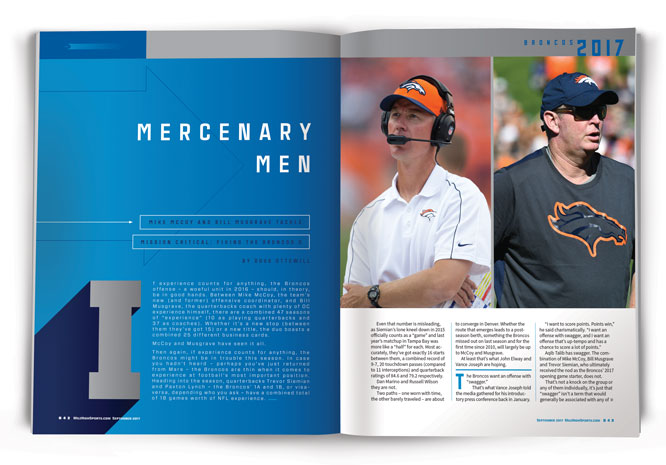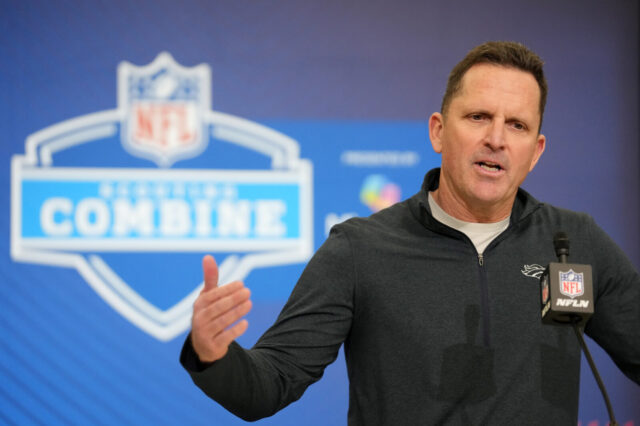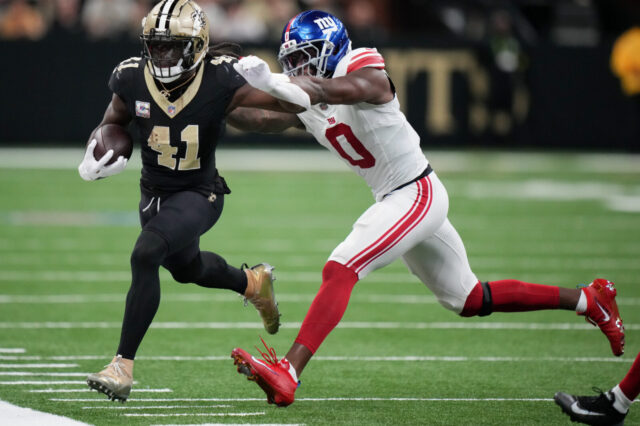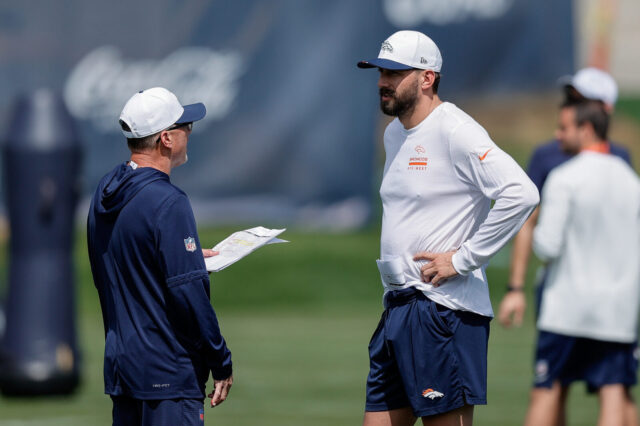This story originally appeared in Mile High Sports Magazine. Read the full digital edition.
If experience counts for anything, the Broncos offense – a woeful unit in 2016 – should, in theory, be in good hands. Between Mike McCoy, the team’s new (and former) offensive coordinator, and Bill Musgrave, the quarterbacks coach with plenty of OC experience himself, there are a combined 47 seasons of “experience” (10 as playing quarterbacks and 37 as coaches). Whether it’s a new stop (between them they’ve got 15) or a new title, the duo boasts a combined 25 different business cards.
McCoy and Musgrave have seen it all.
Then again, if experience counts for anything, the Broncos might be in trouble this season. In case you hadn’t heard – perhaps you’ve just returned from Mars – the Broncos are thin when it comes to experience at football’s most important position. Heading into the season, quarterbacks Trevor Siemian and Paxton Lynch – the Broncos’ 1A and 1B, or visa-versa, depending who you ask – have a combined total of 18 games worth of NFL experience. Even that number is misleading, as Siemian’s lone kneel down in 2015 officially counts as a “game” and last year’s matchup in Tampa Bay was more like a “half” for each. Most accurately, they’ve got exactly 16 starts between them, a combined record of 9-7, 20 touchdown passes (compared to 11 interceptions) and quarterback ratings of 84.6 and 79.2 respectively.
Dan Marino and Russell Wilson they are not.
Two paths – one worn with time, the other barely traveled – are about to converge in Denver. Whether the route that emerges leads to a postseason berth, something the Broncos missed out on last season and for the first time since 2010, will largely be up to McCoy and Musgrave.
At least that’s what John Elway and Vance Joseph are hoping.
***
The Broncos want an offense with “swagger.”
That’s what Vance Joseph told the media gathered for his introductory press conference back in January.
“I want to score points. Points win,” he said charismatically. “I want an offense with swagger, and I want an offense that’s up-tempo and has a chance to score a lot of points.”
Aqib Talib has swagger. The combination of Mike McCoy, Bill Musgrave and Trevor Siemian, who ultimately received the nod as the Broncos’ 2017 opening game starter, does not.
That’s not a knock on the group or any of them individually, it’s just that “swagger” isn’t a term that would generally be associated with any of the three men. Words more frequently used – smart, safe, creative, savvy – will certainly come in handy.
Had “swagger” been the missing ingredient from the Broncos offense last season, it’s quite conceivable that John Elway would have chosen Kyle Shanahan over Vance Joseph to be the head coach of his football team. At hiring time, Shanahan was widely known as the game’s young, hot coordinator – innovative and full of confidence. Again, that’s not a knock on anyone; Joseph’s résumé, primarily compiled on the other side of the ball, is impressive in its own right.
Why then, was the combination of McCoy and Musgrave called upon to boost the Broncos, and most specifically, a pair of inexperienced quarterbacks?
“I want a guy that fits the scheme to the players,” Joseph said, on the same day he demanded swagger, when asked what he wanted to see in his yet-to-be-hired coaching staff. “I want coordinators that put players first and schemes second. If it doesn’t fit the players, let’s not do it.”
Ahh. There’s the read between the lines, the words that say more than they say.
Super Bowl 50 winning coach Gary Kubiak, the true play caller for Denver’s improbable 2015 run, was not a fit-scheme-to-player kind of coach. His adjustments, even with a quarterback as great as Peyton Manning, were minimal. Even those tweaks seemed to surface begrudgingly. Kubiak was effective enough to bring home Denver’s third world championship, but he did it “his way” and perhaps the only way he’s ever known. Kubiak certainly did not acquiesce to the idea of fitting his system to rookie Paxton Lynch.
But McCoy? Now there’s a chameleon more than willing to change his colors given the circumstance.
***
Thank goodness for the bye week.
That’s really all Mike McCoy needed in the fall of 2011. Just two weeks. To completely overhaul the offense of the Denver Broncos.
That’s no joke, certainly not hyperbole. That’s exactly what happened.
Under the tutelage of then head coach Josh McDaniels and then offensive coordinator Mike McCoy, Kyle Orton threw for a career-high 3,802 yards and 21 touchdowns as a Bronco in 2009. Orton’s 2010 Denver encore was nearly as impressive – 3,653 yards and 20 TDs; statistically speaking he was arguably better, posting those numbers in just 13 games. Both seasons represent the best Kyle Orton ever had been or would be.
As the man under center, however, Orton did not produce wins. In 2009 he was 8-7. In 2010 he limped to a 3-10 record before finishing the season on the bench. In 2011, with McDaniels no longer the head coach, McCoy staying on as the offensive coordinator and John Fox running the show as the man in charge, Orton and the Broncos “jumped” out of the gates at 1-4 – including embarrassing home losses to Oakland and San Diego. Denver demanded change.
That change was named Tim Tebow.
The story of Tebow is well told. One of the greatest college quarterbacks to ever play, Tebow entered The League with plenty of doubters. McDaniels was not one of them, drafting the 2007 Heisman Trophy winner and two-time BCS champion with the 25th pick of the 2010 NFL Draft and believing he could play at the next level. But McDaniels wouldn’t hang around Denver long enough to see whether or not he was right about Tebow.
To this day, the debate whether or not Tebow could (or can) play quarterback in the NFL still rages. But one thing is for sure: It was Mike McCoy who had to find out on the fly.
After Orton looked sloppy in the Broncos’ fifth game, a restless crowd at Mile High Stadium practically booed the starting QB out of the game. Tebow came in, went 4-for-10 in the air with a touchdown, galloped for 125 yards and a touchdown, and nearly brought the Broncos back for a fourth-quarter, come-from-behind win. The effort ultimately fell short, but Denver was hooked and suddenly McCoy was saddled with making Tebow a starting quarterback – in just two weeks. (Remember that bye week?)
When Tebow took the field 14 days later in Miami, the Broncos were almost unrecognizable. The play calling was as different as the player under center, but Tebow’s 18 second-half, unorthodox points led to an 18-15 win over the Dolphins. He’d start – and lose – the next week at home against Detroit. He wasn’t great, but the Broncos defense that day was atrocious, allowing 45 points to Matthew Stafford and the Lions. Thus, Tebow was given another chance as the starter. Next up, Oakland, inside the Black Hole.
Had it been another team, in another place, perhaps Tebow’s second win as a starter that season wouldn’t have meant so much. Not only did he emerge from the Black Hole with a victory, but he did so in impressive fashion – he and the Broncos pasted the enemy 38-24. It was really running back Willis McGahee’s 163 rushing yards that flattened the Raiders, but Tebow’s 118 didn’t hurt. McCoy’s offense had a duel threat that kept defenses guessing.
And they continued for seven straight winning weeks. Tebow was miraculous, but there was no question that it was McCoy who had pushed all the right buttons, allowing his rough-around-the-edges gunslinger to do what he did well, while minimizing the things he didn’t.
That, it has been said, is the reason that McCoy was asked to return to Denver – to take a quarterback with deficiencies and tailor an offense to fit his strengths. Denver saw it firsthand with Tebow; surely it would work again, this time with Siemian or Lynch.
In many ways, Siemian is the modern-day Orton: He’s a Big Ten guy. He’s not apt to run. He’s conservative and safe. He’s an inch shorter and eight pounds lighter. He shares the same quiet, ho-hum personality.
Orton had his best years under McCoy.
Conversely, Lynch is perhaps a taller version of Tebow: He’s from down south. He’s more apt to run than throw. He’s not used to a pro-style offense, and he’s got athletic ability largely uncommon to the position. And yet, he’s not quite an NFL quarterback – not yet at least.
Despite all those similar, not necessarily helpful, characteristics, Tebow excelled under McCoy, too. With an even better arm, shouldn’t Lynch be able to do the same?
Regardless of which quarterback takes the majority of snaps under center in Denver this season, McCoy just makes so much sense.
We’ve seen it before. And this time around, McCoy has much more than a bye week to prepare.
***
What if Mike McCoy had nothing to do with Denver’s miraculous run behind Tim Tebow? What if Divine Intervention truly played a part? There are some who might advance such theories.
John Elway is not one of them.
Elway, along with Joseph, undoubtedly looked deeper than one seven-game winning streak. They looked at far more film than just one slant route that turned into an 80-yard, overtime, game-sealing, playoff-advancing win. To suggest otherwise would be a disservice to both McCoy and Musgrave.
The collective, aforementioned experience counts – especially when handling young quarterbacks. But it’s not just the years and miles that matter. Both McCoy and Musgrave have plenty of success stories.
When McCoy first began his coaching career in Carolina, he was given the job of offensive assistant, then wide receivers coach and back to offensive assistant. After four seasons, he became the quarterbacks coach, holding that role through the 2008 season.
In about that same time frame, Jake Delhomme became the Panthers quarterback. Coming to Carolina as a third-year NFL player in 2003, Delhomme had two seasons with just six games of experience in New Orleans, only two as a starter. (He also played the 2000 and 2001 seasons in NFL Europe.) McCoy wasn’t the offensive coordinator in Carolina then – he never was – but he worked closely with Delhomme, who instantly became the starter and threw for 3,219 yards. In the playoffs that season, behind a 6-to-1 touchdown to interception ratio, Delhomme posted a 3-1 record, coolly guiding the Panthers all the way to the Super Bowl.
In 2008, McCoy’s final season with Carolina, Delhomme threw for 3,288 yards and took the Panthers to the playoffs with a 12-4 regular season record in tow. In 2009, after McCoy’s departure to Denver, Delhomme went 4-7 as the starter, compiling a measly 2,015 passing yards. His 8-to-18 touchdown to interception ratio was his worst – by far – in Carolina. While Delhomme won’t be soon confused with a Hall of Famer, it’s hard not to notice the correlation between his performance and McCoy’s presence. In fact, 17,243 of Delhomme’s 20,975 career passing yards were amassed with McCoy as his coach.
Delhomme, Orton, Tebow – all unquestionably second-tier (probably third) NFL quarterbacks. When given the chance with top-flight talent, however, McCoy excelled. In his lone year alongside Peyton Manning, McCoy and the Sheriff boasted the league’s fourth-best offense in terms of yards gained, and its second-highest scoring offense. Manning threw for a whopping 4,659 yards just one season removed from the Tebow experiment. Again, McCoy adjusted what he was doing on the fly.
In his first year as the head coach in San Diego, McCoy and Philip Rivers made it to the playoffs behind the NFL’s fifth-best offense. Even last season, McCoy’s final with the Chargers, his depleted team still managed to be the ninth highest-scoring team in the NFL.
Don’t discount the career of Bill Musgrave, either. Jeff George had arguably his best year as a pro with the ’97 Raiders – Musgrave’s first year of coaching as Oakland’s quarterbacks coach. In 1999 as the quarterbacks coach of the Panthers, Musgrave helped Steve Beuerlein to a league-leading 4,436 passing yards and 277.3 yards per game. In 2005 with the Redskins, Musgrave squeezed the last good year out of Mark Brunell, who hung on for five more seasons. Under Musgrave that year, the 34-year-old signal caller tossed 27 touchdowns and led Washington to the playoffs.
The Falcons entrusted Musgrave with star rookie Matt Ryan in 2008; he even became Atlanta’s assistant head coach in 2010. And plenty of football pundits give Musgrave, who spent 2015 and 2016 in Oakland, credit for the development of Derek Carr, whose Raiders are now favored to win the AFC West.
There is more than enough evidence to suggest that the combination of McCoy and Musgrave will do nothing but good for Denver’s young quarterbacks. And by all accounts, that’s the biggest concern in the Mile High City at present.
“We’re trying to put a system in place for the long haul,” McCoy told the media at the end of July. “When the two quarterbacks are battling, we’re still putting a system in and [finding] who does what best.”
Whoever that quarterback might be over the course of the season, and whatever his best truly is, McCoy and Musgrave are the men charged with that discovery.
At least that’s the idea here in Denver, where a woeful offense and a pair of inexperienced pair of quarterbacks stand between the Broncos and another run at the Super Bowl.



